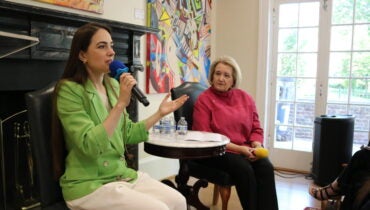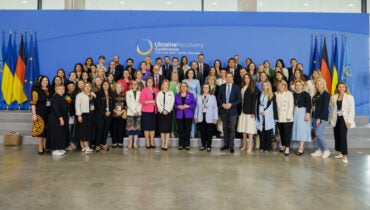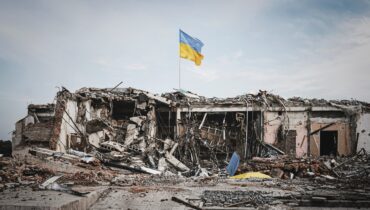As we commemorate the second anniversary of Russia’s inhumane and illegal full-scale invasion of Ukraine, it is crucial to recognize the pivotal role that women have played in Ukraine’s ongoing fight for its sovereignty, and the role they must play in shaping Ukraine’s path forward and post-war recovery. Over the past two years, the Georgetown Institute for Women, Peace and Security (GIWPS) has been dedicated to highlighting the extraordinary leadership roles women have assumed in Ukraine during the ongoing conflict and has advocated for gender-sensitive recovery planning for Ukraine.
Ambassador Melanne Verveer, the executive director of GIWPS, has engaged with Ukrainian women leaders for over 25 years, witnessing the dynamic evolution of the Ukrainian women’s movement, which has contributed to Ukraine’s resilient resistance and fighting spirit during its darkest times. The women’s movement, which gained even greater strength since the Revolution of Dignity in 2014, produced a new generation of women leaders such as Oleksandra Matviichuk, Olena Halushka, and numerous others, who are currently spearheading international efforts to hold perpetrators of war crimes accountable and working toward anti-corruption and transparency reforms to ensure Ukraine’s accession to the European Union.
Women’s civil society organizations, such as the Ukrainian Women’s Fund, have been at the forefront of supporting women’s economic empowerment and adjusting their operations to deliver much-needed health and humanitarian assistance across Ukraine during the war. Sixty thousand women have been serving in the nation’s armed forces, with more than 42,000 in military positions, including 5,000 female soldiers on the front line. Women have also been a driving force behind the nation’s wartime economy, engaging in innovative entrepreneurship and assuming pivotal political roles to shape policies that align the country with present-day realities. This is best exemplified by Ukraine’s rapid digitalization campaign, spearheaded by young women leaders, including Valeriya Ionan, the Deputy Minister for Eurointegration at the Ministry of Digital Transformation of Ukraine.
The resilience women have displayed amid the chaos of war underscore the necessity for their continued involvement in recovery and reconstruction efforts for Ukraine. GIWPS has endeavored to make the case that recognizing women’s contributions to the war effort and their inclusion in all international forums related to Ukraine’s future is not only the right thing to do but also a smart move. Ukrainian women represent half of the country’s most dynamic, educated, and experienced human capital, crucial for Ukraine’s successful recovery.
The path to recovery is marred by the devastating impact of Russia’s actions, which blatantly violate international humanitarian laws. The Independent International Commission of Inquiry on Ukraine, established in accordance with Human Rights Council Resolution 52/32, has consistently documented and reported to the UN General Assembly about Russia’s use of explosive weapons to target residential buildings, civilian infrastructure, and medical institutions, as well as instances of torture and sexual and gender-based violence against women and girls across Ukraine. These egregious acts including the deliberate targeting of civilians, kidnapping of children, and heinous acts of sexual violence demand international attention and accountability.
On Wednesday, February 7, GIWPS, in collaboration with the Embassy of the Republic of Poland and Vital Voices Global Partnership, gathered high-level US government officials, the diplomatic community, and international experts to discuss transitional justice mechanisms for holding Russia accountable for its war crimes in Ukraine. The event also presented a short documentary, “TENETA,” based on witness accounts to Russian crimes in Ukraine, collected by Raphael Lemkin Center for Documenting Russian Crimes in Ukraine, part of the renowned polish organization Pilecki Institute.
High-level speakers, including Polish Ambassador to the United States Marek Magierowski and United States Ambassador-at-Large for Global Women’s Issues, Dr. Geeta Rao Gupta, stressed the urgency of creating concrete justice mechanisms to hold high-level Russian leaders, including President Putin, accountable for war crimes in Ukraine. Dr. Gupta emphasized that “crimes against women and girls are too often underreported, ignored, or forgotten in the larger context of conflict,” and urged international attention to remain on these heinous acts of aggression targeting women and girls across Ukraine. The subsequent panel, consisting of US government and academic representatives, focused on finding consensus on the types of international tribunals and justice paths for Ukraine, emphasizing the importance of investing in initiatives like the Atrocity Advisory Group for Ukraine to document ongoing crimes.
Nobel Peace Prize laureate Oleksandra Matviichuk, addressing the event via video message, advocated for the establishment of a special tribunal on aggression capable of prosecuting Russia’s elite political and military leadership and highlighted the unprecedented “human pain” inflicted on the Ukrainian people. She stressed the importance of humanizing this tragedy, moving beyond sheer statistics of the war, and seeking justice for victims through individualized and comprehensive approaches. Oleksandra’s message and the plight of Ukraine serve as stark reminders of the fragility of peace and the resilience required to rebuild nations torn apart by conflict. They underscore the importance of strengthening existing international institutions designed to protect human rights globally and the need for justice as a fundamental step towards ensuring not only Ukraine’s recovery but preventing future atrocities elsewhere. As we continue to advocate for justice and accountability for Ukraine, Oleksandra and her fellow Ukrainian women leaders embody the narrative of David and Goliath, illustrating what evil and injustice can create. Russia’s aggression has indeed given rise to a robust, resilient, and unstoppable women’s movement, who have become architects of change and have forgotten to fear. Their leadership, both during and after the conflict, is an invaluable asset that must be leveraged for the holistic reconstruction of Ukraine.


